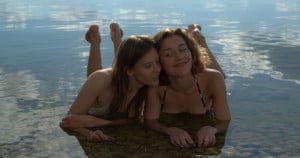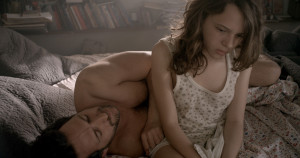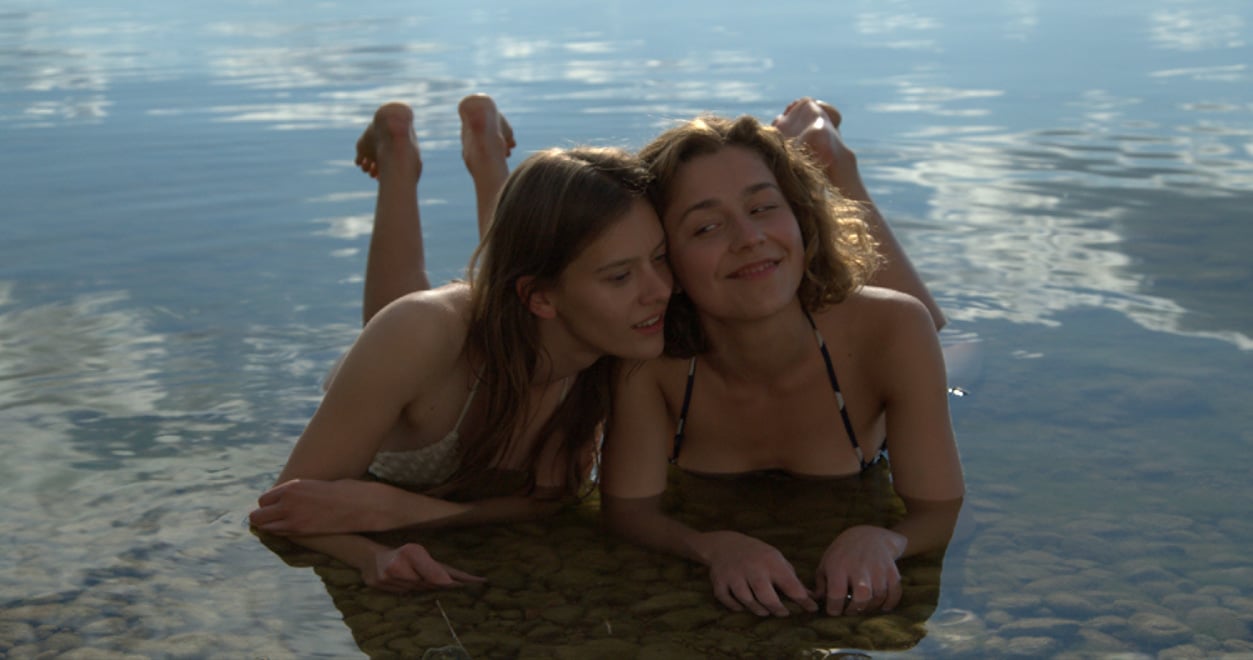While precious few narrative films by female directors make it into the multiplex, there’s a bounty of them screening in the Sundance Film Festival’s World Dramatic Competition. Here’s are some quick takes on a few of them, hailing from countries as diverse as Lithuania and Australia.
“The Summer of Sangailé” (Lithuania, dir. Alantê Kavaïté)

This Lithuanian story of a young lesbian’s sexual awakening is uncommonly sweet, sensitive, and tentative when dealing with her burgeoning romance, but otherwise very thin. Julija Steponaityte plays the titular seventeen-year-old Sangailé who is spending the summer with her parents at their summer home, where they pay little attention to her; she’s become a cutter because of it. When she meets a local girl (Aiste Dirziute) — an aspiring fashion designer with a wardrobe that rivals the outfits in last year’s “God Help the Girl” — at an air show, her love for stunt pilots and her sexual desire for women are awakened.
The girls first become friends, and slowly, tenderly, push the boundaries of that friendship into romance: their sex scenes are all about their freedom and connection, not calisthenics. Director Alantê Kavaïté creates a wonderful intimacy between the two girls and the audience, but her attempts to connect the freedom Sangailé finds from her romance and from the potential of flying are contrived. Sangailé remains forever vague, without ambition or personality; I couldn’t help but wish the film were about her much more vibrant and ambitious lover, instead.
“Princess” (Israel, dir. Tal Shalom Ezer)

Israeli writer-director Tali Shalom Ezer’s “Princess” is also an intimate coming-of-age story, about twelve-year-old Adar (Shira Haas) who is on the brink of womanhood and curious about sex. She lives with her mother (Keren Mor) and her mother’s boyfriend Michael (Ori Pfeffer), with whom she has a close and loving relationship — almost too close.
Ezer explores the boundaries of parental love, and when romantic love can happen between an almost-child and an almost-parent: the abuse, the grey areas, and the confusion. Ezer introduces a döppelganger for Adar, a boy who looks and dresses just like her, whom she meets on the street and who moves in with them. It’s never quite clear if Alan (Adar Zohar Hanetz) is real, or a creation of Adar’s to help her cope with her uncomfortable relationship with Michael, which would be more appropriate with someone her age, or another side of Adar that she’s devised to disassociate herself from her trauma.
Working with some very tight close-ups and the incredibly talented Haas, Ezer gets us into Adar’s headspace, and makes us question what we’re seeing. She shows us the loving nature of Michael while also casting suspicion, from the start, about his intentions and role. It’s an unsettling but probing film with strong work from all of the actors.
“Strangerland” (Australia, dir. Kim Farrant)
To call Australian director Kim Farrant’s “Strangerland” overwrought — the story of an estranged couple, Catherine (a meek and surprisingly plain Nicole Kidman) and Matthew (a stiff and restrained Joseph Fiennes) coping with their children’s disappearance — would be an understatement: the score alone is like a hammer to the head to remind you of the eerie atmosphere intended. Even as Farrant’s camera probes the expansive, rocky and sandy landscapes, it may be beautiful, but the metaphor, that the land tends to swallow people, is heavy-handed at best. Nevertheless, there is plenty of good material here, especially as it deals with how people cope with the aftermath of trauma.
Things are further complicated by the fact that their fifteen-year-old daughter (Lisa Flanagan) has a history of having inappropriate relationships with older men — they recently moved to get away from the gossip surrounding her relations with her former teacher. Matthew has so much shame surrounding what role he may have played in his daughter’s disappearance — he saw her leave but didn’t stop her, almost hoping to punish her, and it’s been suggested he may have abused her — that he’d prefer to preserve his reputation than to let the police, led by a sensitive detective, David (Hugo Weaving), who has lost his own family, pry.
Catherine responds by trying to cling to anyone and anything, throwing herself at her husband with whom she hasn’t been intimate for years, as well as David. She blames herself and her husband, and the guilt is eating away at her. Watching the couple’s journey, into and away from each other, as the layers of suspicion mount, is often compelling and always credible. There are strong performances by all, and Ferrant certainly has an eye for genre-bending. But she aims for obvious cliches instead of trusting her audience to cope with subtlety.
Contact Alexandra Heeney at aheeney ‘at’ stanford.edu.
